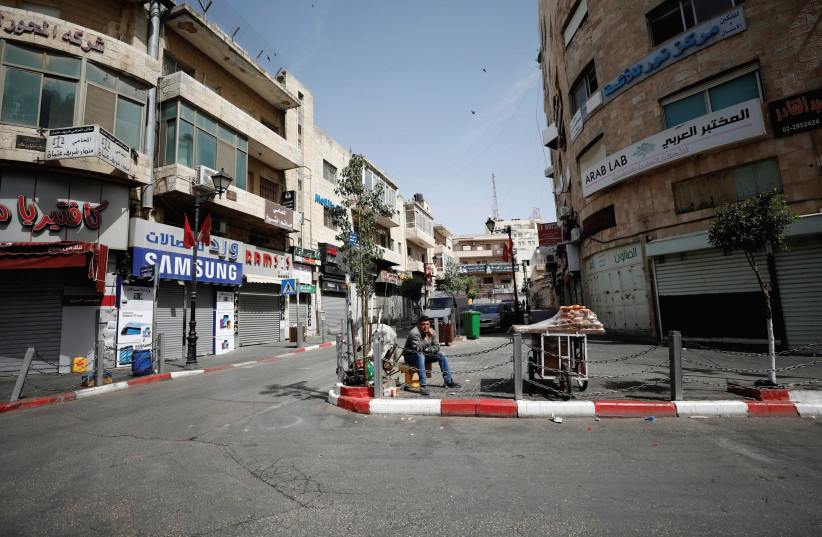Outlook for Palestinian economy ‘bleak,’ World Bank says
Economic growth in the Palestinian territories is expected to slow in 2023, according to a World Bank report released in late April. The report explained that the territories had seen 4% economic growth in 2022, which was attributed to reduced COVID-19 restrictions, but projected that geopolitical tensions and the effects of the Russian invasion of Ukraine will lower growth in 2023 to only 3%.
In 2021, the Palestinian economy grew by 7%.
The report also attributed the slowing Palestinian economy to restrictions on mobility, imports, and trade imposed by Israel, as well as to rising food and energy prices. It noted that the economies of both the West Bank and Gaza were heavily dependent on foreign aid.
“Raising living standards, improving the sustainability of fiscal accounts, and reducing unemployment in a meaningful manner will all require significantly higher growth rates,” Stefan Emblad, World Bank country director for the West Bank and Gaza, said in a press release.
Emblad applauded the efforts of the Palestinian Authority, which has partial civil control over Palestinian areas in the West Bank, to reduce the costs of government salaries, but said, “The overall economic outlook remains bleak.”
 A STREET in Ramallah. The Palestinian economy is suffering. (credit: REUTERS)
A STREET in Ramallah. The Palestinian economy is suffering. (credit: REUTERS)The stagnant Palestinian economy is nothing new
Dr. Nasr Abdel Kareem, professor of finance and economics in the graduate studies department at the Arab American University in Ramallah, told The Media Line that the report of a stagnating Palestinian economy was nothing new.
“The Palestinian economy has a bleak future and lives in a dead end,” he said. “There is no doubt that it is static. It moves horizontally—there are no major collapses, there are no major achievements, there is no significant growth.”
He said that the lack of major growth or collapse was caused by the Palestinian economy’s isolation from the rest of the world.
In a conversation with The Media Line, economic analyst Thabit Abo Al Ros attributed the current economic slowdown to regional political tensions, repercussions of the Russian invasion in Ukraine, aftereffects of the COVID-19 pandemic, and Israeli restrictions on Palestinian movement within the West Bank.
Dependence on Israel is also a factor in the Palestinian economy’s fragility, Abo Al Ros said.
“Israel controls everything, and its intransigence in paying the taxes it collects on behalf of the PA in full, greatly affects the Palestinian economy in a negative way,” he said.
An economic gap also exists between Gaza, the impoverished enclave ruled by the Islamist group Hamas, and the West Bank, ruled by the Western-backed PA, which has a more robust economy.
PA Prime Minister Mohammad Shtayyeh told his Cabinet on Tuesday that the government would pursue reforms to address the territory’s budget deficit but did not offer specifics.
He said that the deficit was caused in part by a dip in foreign donations and by Israel’s policy to withhold some of the tax income it collects from Palestinians.
Israel collects taxes on behalf of the PA and has a policy of withholding some of the tax revenue. The policy is meant to offset the stipends that the PA pays to family members of Palestinians who were killed or injured committing a terror attack or were imprisoned afterward.
A report released by the Palestinian Bureau of Statistics last week showed that unemployment decreased in 2022 compared to 2021 in both the West Bank and Gaza. In the West Bank, the unemployment rate fell from 16% to 13% and in Gaza, it fell from 47% to 45%.
On Wednesday, Prime Minister Shtayyeh offered a different set of numbers, saying that unemployment in the West Bank fell from 19% to 8% due to the efforts of the PA.
Abdel Kareen said that the decrease in unemployment was due not to PA policy but to Israeli policies allowing more workers from the West Bank to enter Israel. He described the Palestinian economy’s close relationship with Israel as an advantage as well as a long-term strategic problem.
“This decline has nothing to do with the Palestinian government, but it is simply the result of the influx of more than 250,000 workers [coming] to Israel to work,” he said. “The existing relationship with the occupation is what pumps life into the Palestinian economy, in addition to the money and transfers of expatriates and some of what international institutions spend in Palestine.”





Comments are closed.